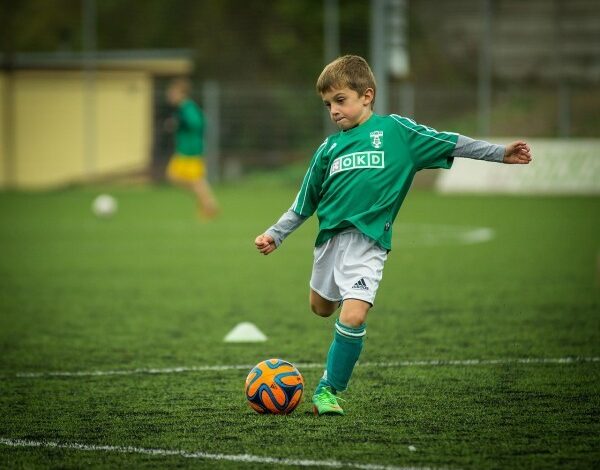How to help your child discover his talent

Everyone, children and adults, is very good at something, and it doesn’t have to be the same for everyone. On the other hand, not all of us have innate talents to discover, but we do all have certain things that we are better at, strengths, strong points.
Your child may or may not have a natural talent , and that’s okay! It is not good for us to compare our children (or children in general), because each one of them follows his own path and his own rhythm.
On the other hand, it is clear that we will feel proud of our children regardless of “that” talent, but it is also true that accompanying them to discover it if they have it (or at least accompanying them to discover what they are passionate about), can be beneficial for their self- esteem and self-awareness.
What is meant by talent and how can we help our son discover if he has one?
What do we understand by talent?
The collects different meanings for the term talent . The first, “intelligence, ability to understand.” The second, “aptitude, ability to perform something”, and the third, “intelligent person or suitable for a certain occupation.”
However, the actual definition of talent is a bit more complex, and in everyday language we know that talent goes far beyond intelligence or performance ability . Thus, it is a highly developed skill in a very specific area.
Talent: something innate?
We could say that talent is what we are given phenomenally by nature , what we excel at “almost unintentionally”, although logically it can also be trained, and it is also linked to aptitudes or intelligence.
Thus, although talent is something innate , the environment (education, school, family, etc.), influences it in two ways; From the environment we identify this talent and also promote it.
In this way, talent is usually associated with an innate ability, but it is also influenced by learning (although to a lesser extent). We all have some kind of talent (sometimes hidden) and we excel at something, although not all of us are aware of it. How to help your child discover his?
How to help your child discover his talent
Although it is true that there are children who discover their talents without realizing it, because it is something very innate, which is usually appreciated from a young age, it is also true that in order to detect talent, one must be attentive and observe it .
Watch our children play, stimulate them, offer them alternatives… Without forgetting to work on that talent, because talent, although it is something “natural”, is also effort and perseverance . As Einstein said, ” genius is made with 1% talent and 99% work “.
And it is that as fathers and mothers, or educators, we can accompany the child in his process of self-knowledge. But how do we do it? Some ideas that can help us are:
Encourage him to try different activities
How to find your own talent? Trying and discovering new things! Therefore, encourage him to try different activities. You can do it from the game , through extracurricular activities, from exploration …
The idea is that you can try different facets of yourself, that you enhance your self- knowledge and that you discover what you like, what you are best at, what you enjoy the most, etc. Of course, always from his interests and preferences, never forcing him to do anything.
Encourage your initiative
When accompanying your child to discover his talent (or his talents), it is also important that you encourage his initiative, and from there discover what he likes.
It is useless to try things reluctantly or without motivation; therefore, help him discover his motivations , because from this initiative, it will be easier and more fluid to find his talent.
Talk about your likes
It’s also important for your child to be able to verbalize what he likes and what he thinks he’s good at. Let’s not forget that talent is something that we are very good at, but it can also be something that we enjoy (although it is not always the case).
Therefore, let him express himself; ask him, encourage him to explain what he has tried, what he is good at at school , what activities or tasks he finds easier or feels more comfortable with, what makes him vibrate.
It is important that you foster an open dialogue with him, with which you seek to get to know him and never judge or direct him.
let him be himself
And it is that talent is also discovered from authenticity ; If you let your child be himself, make mistakes and continue learning without feeling judged, it will be easier for his talents to flourish.
Because he will feel calmer and without pressure to get the best out of him. Let’s not forget that your child has multiple strengths (beyond his talents); his authenticity is his best version of him, and from the most innate part of him, it is from where all his talents are born.
watch it
And finally, watch your child a lot. When children are younger, it is more difficult for them to become self-aware enough to know what their talent is.
For this reason, as parents, we can observe them and identify what they are good at, with which tasks or activities they have greater ease and feel more comfortable, etc.; could it be the numbers? visual memory? Music? The domain of the body? The creativity ?
Watch your child play, learn and have fun . In these three activities or facets, talent is more likely to emerge!
What talent might my child have?
But what kinds of talents (or talents) might your child have? Actually, we are talking about very diverse talents, in different areas or facets.
Some of them: talent for mathematics and numbers, for cooking , painting, crafts and art or creativity, music, sports or body control, languages, and even talent when developing socially and to communicate with others (social skills).
As we can see, they are aspects or facets that children can work on at school , but also outside of it (at home, in extracurricular activities , etc.). The key: to be able to detect these skills and facilities, in any environment.
The balance between enjoying and promoting what you are good at
Of course, it is important that we can detect what our child is especially good at, but it is also important that he can continue to enjoy everything he does (also, what he is “not so good at”!). Let us not forget that they are children , and that the important thing is that they be happy .
Therefore, accompany your child in this process of getting to know each other so that they can feel good about what they are good at, but without forgetting to let them make mistakes and stimulate their well-being. Since his well-being may depend, in part, on his talents, but also on many other things.



